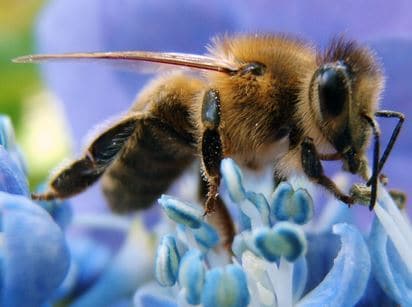By genetically modifying bees to survive the cold weather in Canada, the country would not have to keep importing so many from the United States every year after one quarter of colonies die each winter.
Relying on imported bees is not only costly, it also raises the risk of more ‘killer’ bees coming into the country, as well as new diseases.
Professor Amro Zayed, a bee genomic expert who teaches and carries out research at York University’s Faculty of Science, and Prof. Leonard Foster, who works at the University of British Columbia, are leading a project to develop winter-hardy, disease-resistant bees.
 Prof. Zayed inspecting a bee colony. (Image: YouTube)
Prof. Zayed inspecting a bee colony. (Image: YouTube)
They have been awarded CAN$7.3 million in joint industry-government funding.
Concern regarding Canada’s food security
“It is very clear that we have to develop innovative solutions for bee health because bee declines will have serious consequences for Canada’s economy and food security.”
Canadian honeybees produce about 75 million pounds of honey annually. They also pollinate many vegetable and fruit crops, nuts and oil seeds like canola.
Bees contribute over CN$4.6 billion to Canada’s GDP (gross domestic product) each year. Unfortunately, honeybee health has been declining in Canada, with several beekeepers reporting considerable annual losses over the past ten years.
The scientists will take a state-of-the-art tool for studying the health of humans, and apply it to honeybees.
 If honeybees can be genetically modified to better survive Canada’s winters, the country won’t be so dependent on imports.
If honeybees can be genetically modified to better survive Canada’s winters, the country won’t be so dependent on imports.
Using genetic data to predict bee behavior
Prof. Zayed said:
“Our group has recently shown that you can predict the behaviour of specific colonies by knowing their genetics. We no longer have to spend a lot of time and effort observing colonies to determine if they are going to be healthy or not.”
The researchers will identify genomic and proteomic markers to selectively breed 12 economically viable traits.
Beekeepers will be able to rapidly and cost-effectively breed productive, healthy, disease-resistant bee colonies that can better survive the cold Canadian winters.
As this will not do away with the need to import bees from other parts of the world, the scientists will also develop a cost-effective and accurate test to detect bees with Africanized genetics.
The new test will be an improvement on an earlier version Prof. Zayed and colleagues from the University of Sydney developed.
They hope to eventually have new tools that beekeepers can use.
The researchers believe their project will provide significant economic benefits to Canada, including the country’s agri-food industry and beekeepers, to the tune of up to CAN$150 million annually.
The project, led by Ontario Genomics and Genome BC, will serve as a road map for better global honeybee health.
The research is being funded through the Genome Canada’s 2014 Large-Scale Applied Research Project Competition: Genomics and Feeding the Future. Other funders include the BC Honey Producers Association, the BC Ministry of Agriculture, the University of British Columbia, Genome Alberta and Genome Quebec.
Video – Using genomics to save bees
In this video, Prof. Zayed talks about how genomics tools can help predict bee colony behavior to help breed better bees.

